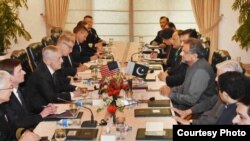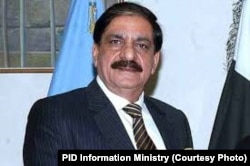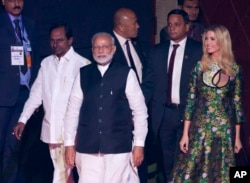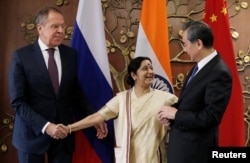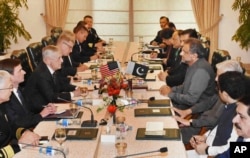Pakistan is accusing the United States of "exporting war" and "perpetual instability" in South Asia, and of "speaking Indian language" in bilateral dealings.
The allegations leveled by National Security Adviser Nasir Janjua again underscore the deterioration in Islamabad's relations with Washington. It also strengthened reported suggestions the two countries are on a collision course, particularly since August when President Donald Trump unveiled a new policy for Afghanistan and South Asia.
The U.S. policy accused Pakistan of harboring terrorist groups, including the Haqqani Network, that are fueling the Afghan war and plotting attacks against India. It also focused on using intensified military means to defeat the Afghan Taliban and called on New Delhi to expand its role in Afghanistan, ignoring Islamabad's opposition and objection.
Janjua reiterated Pakistan's objections while addressing a security seminar Monday in Islamabad. He rejected terror allegations against his country, saying the United States was scapegoating Islamabad for failing to stabilize Afghanistan.
"Pakistan made irrelevant in Afghanistan, scapegoating [and] lumping all the blame [on Islamabad], speaking Indian language on every subject, planing to downgrade all ties, U.S. lawmakers are asking to designate Pakistan as a state sponsoring terrorism," Janjua said.
He went on to complain that despite being a non-NATO ally, Pakistan's attempts to procure U.S. defense equipment have been blocked and its nuclear weapons program is being opposed.
"India has become the preferred ally in Afghanistan and the military solution [for ending the war in Afghanistan] is again given the preference," he noted.
Janjua said the way forward for the United States in Afghanistan is to focus on finding a political solution rather than relying on military might. Washington, he added, should appoint a "political authority" to Afghanistan as empowered as its military commander in the country to promote a political resolution.
Alleging the U.S. wants to contain China's rise and the resurgence of Russia in the region, Janjua said Washington is opposed to Islamabad's multi-billion dollar economic corridor project being funded by Beijing under its global Belt and Road Initiative.
"To mitigate the challenges — China and Russia — and to ensure self-survival, [the] U.S. is exporting war and perpetual instability in South Asia," he said. "India is being supported and encouraged to promote U.S. regional interests. "
US side
There was no immediate reaction from U.S. officials to Janjua's statements.
U.S. Defense Secretary Jim Mattis earlier this month visited Pakistan where he called on civilian and military leaders to redouble their efforts against terrorism. Officials revealed few details of the talks, but described them as positive and productive, dismissing the element of confrontation.
But on Monday, Janjua, who attended the meetings with Mattis, underscored the prevailing mutual disagreements and tensions.
The Trump administration has also warned it may designate certain officials of the Pakistani spy agency, ISI, as global terrorists for their ties to militant groups, including Haqqanis.
Just days before Mattis' visited Islamabad, the CIA director warned if Pakistan failed to act decisively against the Afghan Taliban and Haqqanis, the United States would unilaterally do so.
Last week, Secretary of State Rex Tillerson said in Washington the administration wants to work with Islamabad "in a positive way" to dealing with sanctuaries on Pakistani soil.
"We're willing to share information with them and we want them to be successful," said Tillerson. "But we cannot continue with the status quo, where terrorist organizations are allowed to find safe haven inside of Pakistan."
He was responding to Islamabad's assertions there are no havens in the country and if U.S. authorities shared "actionable intelligence" with regard to terrorist sanctuaries, Pakistani forces are ready to take action against them.




